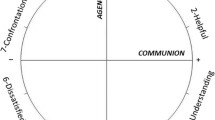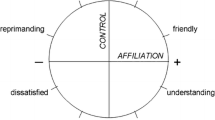Abstract
This study validated the Chinese version of the Questionnaire on Teacher Interaction (QTI) in the Hong Kong context as well as examined the relationship between students’ perceptions of interpersonal teacher behaviour and their cognitive, affective and moral learning outcomes. Data were collected with the QTI and four other measures of student learning outcomes including a modified enjoyment scale of the Test of Science Related Attitudes, academic achievement, attitudes towards the teacher, and learning of values and attitudes. A total of 612 grade 9 students from 16 Mathematics, Chinese and English classes in six schools participated in the study. The Chinese version of the QTI was found to be a valid and reliable measure. Multiple regression analysis revealed that students’ perceptions of their teachers’ interpersonal behaviour were significantly related to their cognitive, affective, and moral learning outcomes.

Similar content being viewed by others
References
Battersby, M. (1999). So, what’s a learning outcome anyway? Vancouver, BC: Centre for Curriculum, Transfer, and Technology. (ERIC Document Reproduction Service No. 430611).
Brekelmans, M., Sleegers, P., & Fraser, B. J. (2000). Teaching for active learning. In P. R. J. Simons, J. L. van der Linden, & T. Duffy (Eds.), New learning (pp. 227–242). Dordrecht: Kluwer.
Brekelmans, M., Wubbels, T., & Creton, H. A. (1990). A study of student perceptions of physics teacher behaviour. Journal of Research in Science Teaching, 27, 335–350.
Brekelmans, M., Wubbels, T., & den Brok, P. (2002). Teacher experience and the teacher-student relationship in the classroom environment. In S. C. Goh & M. S. Khine (Eds.), Studies in educational learning environments: An international perspective (pp. 73–100). Singapore: New World Scientific.
Brint, S., Contreras, M. F., & Matthews, M. T. (2001). Socialization messages in primary schools: An organizational analysis. Sociology of Education, 75, 157–180.
Brislin, R. W. (1980). Translation and content analysis of oral and written material. In H. Triandis & J. Berry (Eds.), Handbook of cross-cultural psychology: Methodology (Vol. 2, pp. 389–444). London: Allyn & Bacon.
Brophy, J. E., & Good, T. L. (1986). Teacher behaviour and student achievement. In M. C. Wittrock (Ed.), Handbook of research on teaching (pp. 328–375). New York: Macmillan.
Chan, C. H., & Chan, Y. F. (2001). You in the eyes of students: Teacher-student interaction behavior study. Hong Kong: Education Convergence/ Department of Applied Social Sciences, The Hong Kong Polytechnic University.
Cheng, Y. C. (1994). Classroom environment and student affective performance: An effective profile. Journal of Experimental Education, 62(3), 221–239.
Cohen, J. (1988). Statistical power analysis for the behavioral sciences (2nd ed.). Hillsdale, NJ: Lawrence Erlbaum Associates.
Cooper, M., Burman, E., Ling, L., Razdevsek-Pucko, V., & Stephenson, J. (1998). Practical strategies in values education. In J. Stephenson, L. Ling, E. Burman, & M. Copper (Eds.), Values in education (pp. 161–194). London: Routledge.
Curriculum Development Council. (2001). Learning to learn, life-long learning and whole-person development. Hong Kong: Hong Kong Special Administration Region of the People’s Republic of China.
De Vellis, R. F. (1991). Scale development: Theory and application. Newbury Park, CA: Sage Publications.
den Brok, P. (2006). Perceptions of teachers: 25 years of research on teacher-student interpersonal behaviour in education. Retrieved from: http://www.uu.nl/uupublish/content/metu-qti.ppt.
den Brok, P., Brekelmans, M., & Wubbels, T. (2004). Interpersonal teacher behavior and student outcomes. School Effectiveness & School Improvement, 15, 407–442.
den Brok, P., Fisher, D. L., & Koul, P. (2005a). The importance of teacher interpersonal behaviour for secondary science students’ attitudes in Kashmir. The Journal of Classroom Interaction, 40(2), 5–19.
den Brok, P., Fisher, D. L., & Scott, R. (2005b). The importance of teacher interpersonal behaviour for student attitudes in Brunei primary science classes. International Journal of Science Education, 7, 765–779.
den Brok, P., Fisher, D. L., Wubbels, T., Brekelmans, M., & Rickards, T. (2006). Secondary teachers’ interpersonal behaviour in Singapore, Brunei and Australia: a cross-national comparison. Asia Pacific Journal of Education, 26(1), 79–95.
den Brok, P., Levy, J., Brekelmans, M., & Wubbels, T. (2005c). The effect of teacher interpersonal behaviour on students’ subject-specific motivation. The Journal of Classroom Interaction, 40(2), 20–33.
Fisher, D. L., & Rickards, T. W. (1997). Cultural and gender differences in teacher-student interpersonal behaviour in science classrooms. In D. Fisher & T. Rickards (Eds.), Science, mathematics and technology education and national development. Vietnam conference proceedings (pp 1–9). Perth: Cartia University of Technology.
Fraser, B. J. (1978). Development of a test of science related attitudes. Science Education, 62, 509–515.
Fraser, B. J. (1981). TOSRA test of science related attitudes handbook. Hawthorn: Australia Council for Educational Research.
Fraser, B. J. (2002). Learning environments research: Yesterday, today and tomorrow. In S. C. Goh & M. S. Khine (Eds.), Studies in educational learning environments: An international perspective (pp. 1–25). Singapore: World Scientific.
Fraser, B. J., Aldridge, J. M., & Soerjaningsih, W. (2010). Instructor–student interpersonal interaction and student outcomes at the university level in Indonesia. The Open Education Journal, 3, 32–44.
Fraser, B. J., & Tobin, K. (1991). Combining qualitative and quantitative methods in classroom environment research. In B. J. Fraser & H. J. Walberg (Eds.), Educational environments: Evaluation, antecedents and consequences (pp. 271–292). Oxford: Pergamon.
Goh, S. C., & Fraser, B. J. (1995). Learning environment and student outcomes in primary mathematics classrooms in Singapore. Paper presented at the annual meeting of the American educational research association, San Francisco, CA.
Goh, S. C., & Fraser, B. J. (1996). Validation of an elementary school version of the questionnaire on teacher interaction. Psychological Reports, 79, 515–522.
Goh, S. C., & Fraser, B. J. (1998). Teacher interpersonal behavior, classroom environment and student outcomes in primary mathematics in Singapore. Learning Environments Research, 1, 199–229.
Goh, S. C., & Fraser, B. J. (2000). Teacher interpersonal behavior and elementary students’ outcomes. Journal of Research in Childhood Education, 14, 216–231.
Halstead, J. M. (1996). Values and values education in schools. In J. M. Halstead & M. J. Taylor (Eds.), Values in education and education in values (pp. 3–14). Washington, DC: Falmer Press.
Kim, H. B., Fisher, D. L., & Fraser, B. J. (2000). Classroom environment and teacher interpersonal behavior in secondary science classes in Korea. Evaluation and Research in Education, 14(1), 3–22.
Kokkinos, C. M., Charalambous, K., & Davazoglou, A. (2009). Interpersonal teacher behavior in primary school classrooms: A cross-cultural validation of a Greek translation of the Questionnaire on Teacher Interaction. Learning Environment Research, 12, 101–114.
Leary, T. (1957). An interpersonal diagnosis of personality. New York: Ronald Press Company.
Lovat, T., & Clement, N. (2008). Quality teaching and values education: Coalescing for effective learning. Journal of Moral Education, 37(1), 1–16.
Patton, M. Q. (1990). Qualitative evaluation and research methods. Newbury Park, CA: Sage.
Petegem, K. V., Creemers, B. P. M., Rossel, Y., & Aelterman, A. (2005). Relationship between teacher characteristics, interpersonal teacher behaviour and teacher wellbeing. The Journal of Classroom Interaction, 40(2), 34–44.
Russo, T., & Benson, S. (2005). Learning with invisible others: Perceptions of online presence and their relationship to cognitive and affective learning. Educational Technology & Society, 8(1), 54–62.
Sivan, A., & Chan, W. K. D. (2008). Values education in Hong Kong classrooms. Learning and Teaching, 1(2), 75–85.
Telli, S., den Brok, P., & Cakiroglu, J. (2007/2008). Teacher-student interpersonal behavior in secondary science classes in Turkey. The Journal of Classroom Interaction, 42(2), 31–40.
Wubbels, T. (1993). Teacher-student relationships in science and mathematics classes. In. B. J. Fraser (Ed.), Research implications for science and mathematics teachers, Vol. 1 (Key Centre Monograph No. 5). Perth, Australia: Curtin University of Technology.
Wubbels, T., & Brekelmans, M. (2005). Two decades of research on teacher–student relationships in class. International Journal of Educational Research, 43, 6–24.
Wubbels, T., Brekelmans, M., & Hooymayers, H. (1991). Interpersonal teacher behavior in the classroom. In B. J. Fraser & H. J. Walberg (Eds.), Educational environments: Evaluation, antecedents and consequences. Oxford: Pergamon Press.
Wubbels, T., & Levy, J. (Eds.). (1993). Do you know what you look like? Interpersonal relations in education. London: The Falmer Press.
Wubbles, T., Creton, H. A., Levy, J., & Hooymayers, H. P. (1993). The model for interpersonal teacher behaviour. In Th. Wubbels & J. Levy (Eds.), Do you know what you look for? Interpersonal relationships in education (pp. 13–28). London: Falmer Press.
Yuen, H. K. (1999). Communication styles of tertiary teachers. In J. James (Ed.), Quality in teaching and learning in higher education (pp. 3–8). Hong Kong: Hong Kong Polytechnic University.
Author information
Authors and Affiliations
Corresponding author
Rights and permissions
About this article
Cite this article
Sivan, A., Chan, D.W.K. Teacher interpersonal behaviour and secondary students’ cognitive, affective and moral outcomes in Hong Kong. Learning Environ Res 16, 23–36 (2013). https://doi.org/10.1007/s10984-012-9123-5
Received:
Accepted:
Published:
Issue Date:
DOI: https://doi.org/10.1007/s10984-012-9123-5




